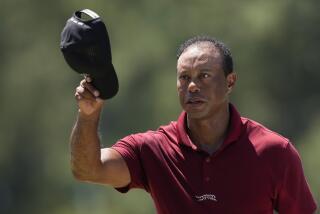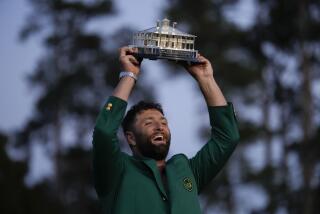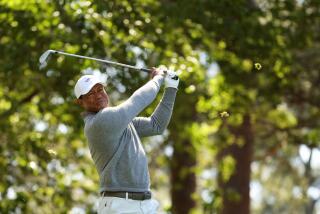Amen to that
Last week, Mark O’Meara was picking up his father to take him out to dinner when someone mistook O’Meara for another pro golfer, Mark McCumber. All O’Meara could do was laugh.
“The last time somebody thought I was Mark McCumber was in Augusta, a few days before the 1998 Masters, at the Longhorn steak house on Washington Road,” O’Meara said. “You know, I may have to eat there again.”
For someone who’d had a steady diet of not winning majors, that Masters 10 years ago was what changed everything for O’Meara. He won. And only three months later, at the British Open at Royal Birkdale, O’Meara had seconds. He won another major.
Just like that, a reputation changed, a career reinvented itself, and nothing was ever the same again. It all swung into motion on the storied grounds of the Masters, a tournament that once again chose to provide the precise jumping-off point for history, the exact intersection of circumstance and heroics.
On this occasion, this is just where O’Meara found himself.
He was far from a non-factor, not with 14 PGA Tour victories in a pro career that began in 1980, but at 41, O’Meara had never won a major, and that blip on his resume bothered him more than he was willing to admit.
Fred Couples led, or shared the lead, after each of the first three rounds in the 1998 Masters, but O’Meara’s third-round 68 put him in the last group with Couples on Sunday.
Couples played well and finished with a two-under 70, but O’Meara was better. He birdied the last two holes and three of the last four. He rolled in a 20-footer at the 18th to edge Couples and David Duval by one shot.
It all happened 10 years ago, but it has been a swift decade, O’Meara said.
“I mean, I was 41, to have something like that happen, it was a dream come true, totally unexpected. And how it all unfolded, to make that putt, the late birdies, it was magical.”
O’Meara remembers feeling an eerie calmness as he stood in the 17th fairway.
“It really slowed down for me. I guess that’s what they mean when people say ‘in the zone.’ There was this calming effect,” he said. “I saw the shadows cast by the stands, watched the sun shine through the trees, I heard the birds chirping.”
O’Meara said he told his caddie, “Why don’t we just birdie the last two holes?” He didn’t even know why he said it, he just said it. A nine-iron at the 17th gave him a look at his birdie there, which O’Meara cashed in. He remembers Couples winked at him.
Then he reached the green in two shots at the par-four 18th and stood over his putt.
“My mouth was dry, my heart was racing,” O’Meara said. “When the ball was two feet off my putter, I knew I hit a good putt. Then, ‘That looks pretty good,’ and only a foot away, ‘It’s going to go in’ and then, ‘Please don’t lip out.’ ”
The ball moved to the left center of the hole and fell in.
“I thought, ‘Oh, what did I just do? I won the Masters.’ ”
Afterward, in the ceremony at Butler Cabin, 1997 champion Tiger Woods, a close friend of O’Meara’s, fitted his older buddy with his own green jacket.
“That was just surreal,” O’Meara said.
He had come close to winning a major before, at the 1991 British Open, where he played in the last group with eventual winner Ian Baker-Finch. But that was seven years before, and this was now; this was different, this was his time.
“People are going to remember players who make putts on the last hole to win,” O’Meara said. “No one gave it to me, I went out and won it. Maybe no one felt I could do it, maybe even me.”
Not long before O’Meara visited Butler Cabin, there was another player inside, sitting in a chair next to Augusta National Chairman Jack Stephens. Duval, who closed with a 67, was watching O’Meara line up his 20-foot putt at the 18th, waiting to see if there would be a playoff.
“David,” Stephens said, “nobody makes this putt.”
Then it went in.
“Well, thanks for coming, David, see you next year,” Stephens said.
The next April, when O’Meara was welcomed into the tiny but exclusive locker room for champions only at Augusta National, he was shown to the polished wooden locker he would share with another past champion.
It was Gene Sarazen, whose 235-yard double eagle on the 15th hole helped him win the 1935 Masters. It became one of the most famous shots in golf and put the year-old tournament on the map.
But that’s another story.
Here are a few more, all of them anniversary tales, and for some reason, each is filled with its own version of Masters irony, history and heroics. That’s the nature of the place.
1988, Sandy Lyle
He was a lanky Scot with an easy smile and a smooth swing, but what was he doing leading after the second and third rounds?
Lyle, 30, already had one major title -- the 1985 British Open at Royal St. George’s, where he defeated Payne Stewart by one shot -- but he hadn’t finished in the top 10 in his eight previous Masters.
Mark Calcavecchia had finished his fourth round of two-under 70 and his scorecard of six-under 282 was looking good when Lyle reached the 18th tee, then knocked his tee shot left into a fairway bunker.
Lyle hit a seven-iron and put his shot on the green, some 10 feet above the hole. He made the putt to win. It was only the fourth time a player had made a birdie on the last hole to win the Masters and the first time in a decade, since Gary Player.
1978, Gary Player
Yes, 10 years before Lyle, Player did it, a 15-footer on the last hole to win.
He shot a final-round 64 that included seven birdies over the last 10 holes. Seven shots behind leader Hubert Green after 54 holes, Player’s 64 tied the course record at the time.
Player’s third and last Masters title came 17 years after his first and he wound up beating Green, Rod Funseth and defending champion Tom Watson by one shot.
And now this week, 30 years later, the 72-year-old Player will play in a record 51st Masters.
1968, Bob Goalby
Another historic Masters, or would notorious be a better word? Goalby, 39, won his first and only major, helped by a monstrous gaffe by Roberto De Vicenzo.
Goalby held a one-shot lead going into the last day and manufactured a six-under 66. Playing on his 45th birthday, De Vicenzo apparently had caught Goalby to force a playoff, but he did not check his scorecard and turned in an incorrect card (kept by Tommy Aaron) that showed a par four at the 17th and not a birdie three. Instead of the 65 he shot, he was credited with a 66.
De Vicenzo finished one shot back and uttered one of the most unforgettable laments in golf: “What a stupid I am.”
1958, Arnold Palmer
Half a century ago was the first time Herbert Warren Wind used the words “Amen Corner” in describing the 11th, 12th and 13th holes at Augusta National that wrap around Rae’s Creek.
Besides that, it was the first major victory for Palmer, and his first of four Masters titles.
The last round was played on Easter Sunday and Palmer, 27, began it tied for the lead with Sam Snead, 45. The day turned for Palmer at the 12th hole, where his tee shot flew the green and was embedded. He asked for a ruling to be allowed a drop but was turned down. Palmer insisted he was within his rights, so he played a provisional ball. He made a double-bogey five with the embedded ball, a par with the dropped ball, and then found out later that he had a favorable ruling and could use his lower score.
Even though Palmer shot a one-over 73 on the last day, and bogeyed the 16th and 18th holes, he managed to nose out defending champion Doug Ford and Fred Hawkins by one shot after they both missed birdie putts at the 18th.
Tied for fourth was Ken Venturi, 26, who led after the first and second rounds and was battling memories of losing the 1956 Masters when he shot a fourth-round 80, after leading the first three rounds.
Palmer eagled the 13th hole on Sunday. Starting in 1958, Palmer either led or tied for the lead after 18 holes, 36 holes and 54 holes 14 times in eight straight years -- and he won four of those eight.
1948, Claude Harmon
Harmon equaled the then-tournament record with a nine-under 279, shot a two-under 70 in the last round, and defeated Cary Middlecoff by five shots. His prize: $2,500. Green jackets weren’t awarded until the next year (but that’s another story).
Harmon was the father of Butch Harmon, who coached Tiger Woods to a record-setting 18-under score of 270 in the 1997 Masters (but that’s another story too).
There was no cut in the 57-player field, although three players withdrew after three rounds. Tied for 50th, and ahead of four others who played all four rounds, Bobby Jones shot 74, 79, 86, 74. It was his last Masters. He was 46.
1938, Henry Picard
It wasn’t even known as the Masters yet when Picard won, scoring a two-shot victory over Ralph Guldahl and Harry Cooper. The event was called the Augusta National Invitation Tournament and the name wasn’t changed until a year later, when Guldahl became the first Masters winner.
This was the only Masters when play was scheduled to begin Friday. It was suspended because of bad weather and the first round was played Saturday, the second and third rounds on Sunday and the last round on Monday. Picard was six under on the 16th, 17th and 18th the last three rounds and his closing 70 earned him $1,500.
After his victory, Picard left his job as head pro at Hershey Country Club in Pennsylvania, but he had somebody in mind to replace him and made certain that man got the job. His name was Ben Hogan.
--
More to Read
Go beyond the scoreboard
Get the latest on L.A.'s teams in the daily Sports Report newsletter.
You may occasionally receive promotional content from the Los Angeles Times.










